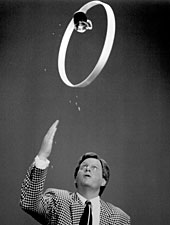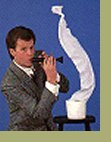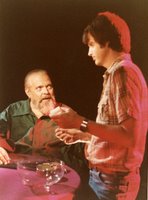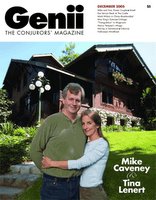7/07/2006
On July 10, 1998 as President of S.Y.M. 29, I made it my goal to interview as many professional magicians as I could for the Boston Mini Wizard. With my microcassette recorder in hand, I had the opportunity to interview Long Beach Mystic alumnus, Mike Caveney.
Mike Caveney is a magic performer, publisher, author, consultant and inventor. He frequently appears at magic conventions including Hank Lee’s Cape Cod Conclave and the Society of American Magicians National Convention. He is known for his linking coathangers routine, arm juggling, bow and arrow card stab, and the appearing chicken from a borrowed coat trick. His publishing company Mike Caveney’s Magic Words has a reputation for producing the finest books on the history of magic. He has consulted for numerous magicians including David Copperfield and the late Orson Welles. During my interview with Mr. Caveney, he commented on the involvement of magic in his life, especially as a young person. It was very encouraging to hear a veteran of magic, whom I respect, expound on the meaning of magic in his life with the enthusiasm of a kid.
This is the audio interview with Mike Caveney from which today's interview post was transcribed. Running time 8:15. It may be a strain to hear:
The Mini-Wizard: Has the Long Beach Mystics helped in your magical development?
Mike Caveney: Yes, tremendously so. You know these kids today they don’t know what to do, they don’t have any interests, they fool around. They are wasting their life. If you could be so lucky as to find what you are interested in, and then find a bunch of friends the same age that you can do that with; it’s great. I grew up with all these guys, some of them became magicians, some of them didn't, but we are still friends; even the ones that became schoolteachers, or dentists and magicians. We’re still old friends and it’s great. We see each other all the time. It was competitive when we were younger. We all wanted to have a great act, and we helped each other because we all had different types of acts. We certainly all advanced faster as being a part of this group than we would have had we been sitting at home thinking about it for ourselves. We’d have a meeting and everyone would throw in an idea. “Well what about this for an idea?” and “What about this?” And I thought “Wow! I have so much to think about, so much to work on.” It was great.
The Mini-Wizard: So you found being honest with yourself and others important in the growth of an act?
Mike Caveney: Absolutely. Especially with a group of friends no one was afraid to go up and say “Ali, that trick stinks.” And you’d go “Oh my…Aw, how could he say….” (but he would continue) “Look, it just doesn’t fit you. But that other trick that you did, we think that’s great and we think that’s what you should pursue.” He’d say “Well, ok.” It hurts to have some one tell you that, but in the long run you’re better off. We’d go to magic shows together and watch the old professionals work and we would get inspired and go back and be real honest with each other; which was great. You could do a trick for your mom and dad or aunt or uncle and they think it’s great no matter what you do and that doesn’t really help you. It’s great to have some friends who aren’t afraid to say “Hey man, I was sitting on the side and you flashed everything. You gotta cover you angles.” And that helps.
professionals work and we would get inspired and go back and be real honest with each other; which was great. You could do a trick for your mom and dad or aunt or uncle and they think it’s great no matter what you do and that doesn’t really help you. It’s great to have some friends who aren’t afraid to say “Hey man, I was sitting on the side and you flashed everything. You gotta cover you angles.” And that helps.
The Mini-Wizard: Any last words…
Mike Caveney: Well here’s what I think. You guys are lucky that you are young magicians now because this is the biggest magic boom of the century and I mean the whole 1900’s, twentieth century. There is nothing that has gone on like what is going on now. When people say “What was the real golden age of magic?” It’s today. It’s never been this good. It’s unbelievable. When I was a little kid there might be one magician on Ed Sullivan, once a month, and we’d get four minutes of magic on TV a month. Now there’s a magic special on every month it seems like. There are so many conventions, so many places to work; it’s really amazing. So there is no reason why if someone really wants to make their living doing magic they can’t do it because there are so many different ways to go: working in night clubs, working in the corporate world doing trade shows, running a magic shop, doing a magazine….
(When I was young) Channing Pollack was a great magician who worked in a nightclub. And most of the nightclubs were in Europe. Well, as much as I wanted to be a magician, I kind of didn’t like the idea of working for a bunch of drunks or in a smoky nightclub. That didn’t sound like fun to me. So I wasn’t sure what I was going to do because I thought if you are a magician, that’s what you do. Then I found out about trade shows--guys who do magic for businessmen at conventions and that made a lot more sense to me. And I said “That sound’s like fun…working for really smart people and  making really good money.” So that’s what I headed into. But until I found out about that, I went to college and graduated from college. Stan (Allen) went to college and Mike Weber went to college. Mike Weber’s got a law degree, which is fine. He’s a smart guy and now he’s a magician. I think school’s good.
making really good money.” So that’s what I headed into. But until I found out about that, I went to college and graduated from college. Stan (Allen) went to college and Mike Weber went to college. Mike Weber’s got a law degree, which is fine. He’s a smart guy and now he’s a magician. I think school’s good.
I’ve got a perfect example. I just worked on a ship down in South America. It’s a really tiny ship and a really expensive ship. The people that take these cruises are millionaires. So they want you to be able good magician but they say “Look, we know you can do magic, but we want you to able to have dinner with these people sit with them, talk to them for two weeks.” And these people have been around the world running a big company and stuff and they want you to be able to talk to these guys. Well at that point I thought “I’m glad I went to college, I’m glad I read the newspaper and watch the news so I know what’s going on.” So it was real easy to talk to these people. But here’s the best advice. This cruise line said “Most magicians don’t work on this cruise ship. These people are very sophisticated, wealthy and they travel in very high social circles.” So they were afraid that they wouldn’t like magic. I know from experience, as you guys know too, that I don’t care who it is… whether it’s a homeless guy or a millionaire, they all turn into ten year old kids. As soon as those sponge balls appear in their hand, they go “Wow!! How did you do that? That’s great!” Magic is a great equalizer. That’s what I found, even on this ship. It made me think that I picked the best, best job in the world; magic.
I was in Romania once and I met some Romanian kids on the beach. I couldn’t speak their language but I got some seashells and did some tricks for them and their eyes lighted up; they couldn’t believe it. It’s the greatest thing you can learn. Even the Long Beach Mystics who didn’t be come magicians, became school teachers and all these other jobs all that they learn growing up being magicians has helped them a lot in their career.

Read about Mike in the December 2005 issue of Genii Magazine. Thanks to Genii forum and visitors for your readership!



0 comments:
Post a Comment